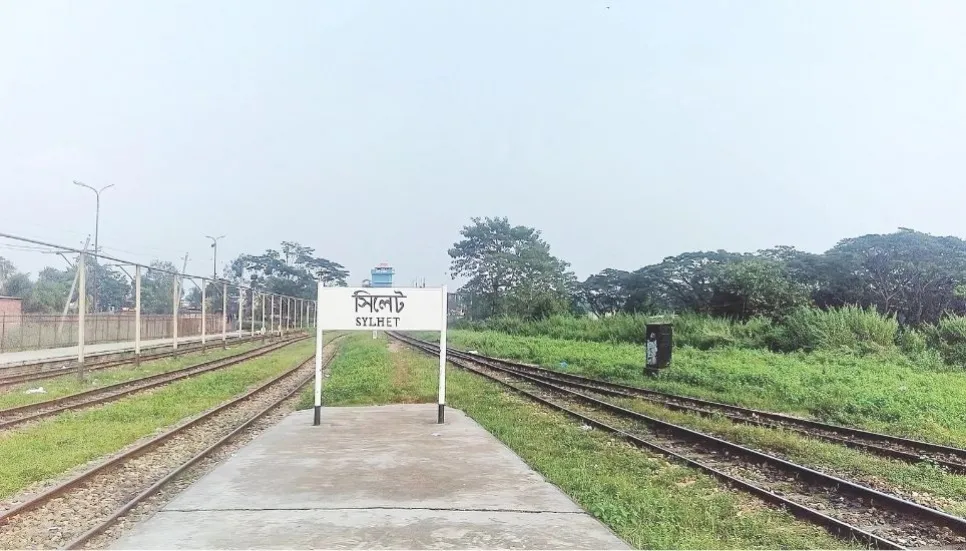
In 1995, Sylhet split from the Chattogram Division and was declared the 6th division of the country. Since then, various ministries and government departments have established divisional offices in Sylhet.
However, despite its administrative growth, Bangladesh Railway has yet to set up a divisional office in the region. As a result, Sylhet's railway services continue to be managed from the Chattogram divisional railway office, creating inefficiencies and delays in service delivery.
This situation has not only hindered the development of railway infrastructure in Sylhet but has also deprived passengers of services that meet their needs. Normal railway operations are often disrupted and there is no mechanism for immediate resolution of issues due to the centralisation of control in Chattogram.
Currently, inter-city trains like Kalni Express, Jayantika Express, Parabat Express and Upaban Express operate on the Sylhet-Dhaka-Sylhet route, while the Surma Mail provides mail train services.
Additionally, the Paharika Express and Udayan Express run on the Sylhet-Chattogram-Sylhet route. These trains serve several stations, including Moglabazar, Maizgaon, Kulaura, Longla, Shamsernagar, Vanugach, Sreemangal, Rashidpur, Satgaon, Shayesthaganj, Shahjibazar, Nowapara, Montola, Horoshpur, ensuring passenger connectivity across the region.
However, the Sylhet-Chatak route has been suspended due to flood damage from the year 2022, causing further disruption.
Despite these, the lack of a divisional office continues to negatively impact railway operations in Sylhet. Whenever a technical problem arises, the local railway officials must inform the Chattogram office and wait for a solution, even for minor issues such as replacing a nut or bolt. This bureaucratic process causes delays and often leaves passengers waiting longer than necessary.
In addition to operational inefficiencies, Sylhet’s railway infrastructure is also being underutilised. The region has significant railway assets, including land and facilities in various areas, yet these resources are not being managed effectively due to the absence of a divisional office.
The call for a divisional railway office in Sylhet is not new. In 1995, when the government established Sylhet Division, separating it from Chattogram, other government agencies, including law enforcement, set up their divisional offices in Sylhet. Yet, the railway continues to operate under the Chattogram divisional railway office’s control, following the old system.
According to sources, if any issue occurs within Sylhet's railway operations, such as a malfunctioning train engine or a need for additional coaches, the local railway manager must send a formal request to the Chattogram office.
A railway official, who preferred to remain anonymous, said that if a divisional office were established in Sylhet, the local authorities would be able to manage resources like engines and coaches more effectively.
"If the demand for passenger services increases, we could easily add more coaches, and even in the case of an engine failure, we’d have reserves to ensure smooth operations," the official said.
"Currently, we are unable to act independently and must always wait for instructions from Chattogram."
The official added that a divisional office would allow for the posting of senior managers, engineers, and other key personnel directly in Sylhet. This would improve efficiency and allow the region’s railway services to meet the growing demand.
Concerns from local leaders
Farooq Mahmud Chowdhury, divisional coordinator of SUJAN in Sylhet, expressed serious concern over the absence of a divisional railway office.
“It’s standard practice that when a division is established, the corresponding departmental offices are also set up to manage services for the public. It is unacceptable that the railway has not done this in Sylhet, even after three decades of establishing the division,” He said.
He further emphasised that without a divisional office, it is impossible to expect adequate services from the railway.
“How can we expect efficient services when the region is being managed from so far away? Sylhet’s railway infrastructure cannot develop if there are no senior officials based here. We need offices at every level to ensure the smooth running of operations.”
He also pointed out the lack of manpower as a significant issue. “Railway services require proper management and sufficient staff to ensure that passenger needs are met. Sylhet urgently needs a divisional office to address these gaps and improve the overall quality of railway services in the region.”
Official response and prospects for change
Sylhet Railway Station Manager Nurul Islam said that his team is doing their best to manage services from the Sylhet Railway Station. “We are working hard to provide regular railway services to the public, but the decision to establish a divisional office lies with the Ministry of Railways,” he said.
Bangladesh Railway’s Director General Sardar Shahadat Ali also acknowledged the need for a divisional railway office in Sylhet. He explained that Bangladesh Railway is currently divided into two regions, centred on Chattogram and Rajshahi and that Sylhet and Mymensingh do not have divisional offices.
“Times have changed, and the railway’s capacity is increasing day by day. It’s clear that establishing divisional offices in regions like Sylhet is now necessary to keep pace with the growing demand,” Shahadat Ali said.
He added that the issue of establishing a divisional office for Sylhet will be presented to higher authorities soon.